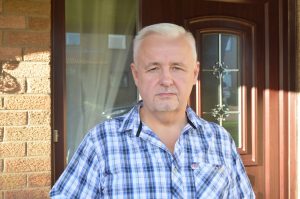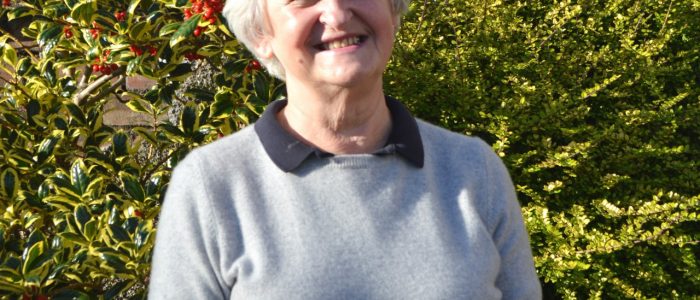‘Boot Camp’ Aids Recovery After Bowel Surgery
Patients in Forth Valley undergoing bowel surgery are now being invited to take part in a special programme which speeds up recovery and cuts the time spent in hospital from several weeks to several days. Results so far have been impressive with NHS Forth Valley consistently leading the way in the adoption of the National Enhanced Recovery Initiative.
As well as undergoing a detailed pre-operative assessment which looks at their current health and what they can do to improve it prior to surgery, the initiative includes a special preparation ‘boot camp’ which gives patients the chance to meet with other patients and discuss with staff what will happen before, during and after their operation. These group sessions are designed to ensure patients are as prepared and knowledgeable as possible, are actively involved in their own care and feel empowered to ask questions at any point in their treatment.
The results are particularly encouraging for patients undergoing keyhole surgery for conditions such as bowel cancer, inflammatory bowel conditions (such as Crohn’s and Colitis) and diverticular disease. Patients who are likely to require a stoma, ileostomy or colostomy bag are also invited to sessions before their operation where staff show them how to use and change the bags, answer any questions they may have and provide information.
So far more than 100 patients in the Forth Valley area have benefited from the initiative.
Linnet McGeever, NHS Forth Valley’s Lead Nurse for Colorectal Cancer and Project Manager for the recovery initiative, said: “Patients often find it difficult to take in information after major surgery so we now bring them in before their operation when they are more receptive and also find it reassuring to have the opportunity to ask questions and practice using different products in advance.”
The first 24 hrs after major surgery is critical and a number of steps are taken to support recovery. This includes getting patients back on their feet to reduce the risk of blood clots and chest infections, ensuring they are able to eat and drink within a day to reduce dehydration and removing devices such drips and catheters to reduce the risk of infections. Patients are also given detailed information on what to expect once they go home and what warning signs to look out for. Uniquely in NHS Forth Valley, patients taking part in the initiative are also given the direct number for the on-call surgeon who they can contact if they have any concerns or problems.
Mr Paul Hendry, Colorectal Surgeon and Clinical Lead for the Recovery Programme, added: “All our consultant surgeons who perform these operations are trained in keyhole surgery, many having undertaken advanced laparoscopic training in specialist centres around the world.
“We are probably the only hospital in Scotland which gives patients a direct link to the surgical team who can provide advice or arrange for them to come back up to the hospital to be seen in the Surgical Assessment Unit. So far, no one has abused this access as patients realise that this an emergency number and should only be used for serious issues or concerns.
“In many cases we are able to provide advice, reassurance or follow-up checks which ensure patients don’t have to come back into hospital unless they really need to. As a result, our readmission rate for this type of surgery is lower than the national average and patients suffer fewer complications as they know what to look out for and are encouraged to take action at an early stage.”
Patients are also followed up after surgery and those being treated for cancer are also offered an appointment with a Macmillan Nurse within a fortnight.
Clackmannanshire Patient Case Study – Eileen Grinly from Alva
It was in April 2015 that Eileen Grinly from Alva lost her husband David to bowel cancer. The following year Eileen herself received a shattering diagnosis – she too had bowel cancer. Eileen had nursed her husband at home after he had received chemotherapy and radiotherapy, and was well aware of the vagaries of the disease. So when problems were spotted during a colonoscopy after she developed anaemia, her first thought was “please, please, please, I know how this could go. Please don’t go the same way. It was just a shock actually”
Eileen is full of praise for the oncology team and Macmillan nurses at Forth Valley Royal Hospital. She said: “The whole team knew what the background was, and understood how me and my family would be feeling. The whole thrust of ERAS (Early Recovery After Surgery) is that the patient becomes fully involved and works in partnership with the surgical team, so they knew I would be a prime candidate for the sake of my family.”
One of the keys to success is exercise and for three weeks before her operation Eileen spent 30 minutes a day either walking, swimming, or running up and down stairs with her sister to see who would be out of puff first. “I made it a mission and reckon I was very lucky to have my sister, children and friends to support me. You really have to get yourself match-fit.”
Eileen hung on to the fact that her surgeon had spoken of a ‘curative’ operation and went down to theatre on a Monday. Early next morning she was visited by a physiotherapist and the following day got up, showered, washed her hair and put her make up on, then walked to the hospital restaurant – rather than the luxury hotel which had been booked previously – to celebrate her daughter’s birthday. She was doing so well that a nurse asked “which one of you is the patient?” After being told protein was good for recovery the birthday party all decided to tuck into a special meal of omelettes!
Just three days after her operation Eileen was discharged from Forth Valley Royal Hospital and said she very much valued being provided with the emergency surgical number for clinical advice. Reflecting on her experience Eileen said: “This initiative worked for me because I participated. It also gave me a sense of job satisfaction, a job well done.”
Eileen’s last CT scan was clear and she says she owes much of her post-recovery success to improving her fitness levels in the weeks before surgery. She was back driving again within the month and, although feeling a little tired, said people had to constantly remind her that she had undergone major surgery.
Stirling Patient Case Study – David Lewis from Bannockburn

Bannockburn train driver David Lewis, who is in his 50’s, underwent surgery on a Tuesday. Two days later he left the ward and walked to meet his wife and parents in the restaurant at Forth Valley Royal Hospital. The next day he was allowed home.
Like other patients on the Enhanced Recovery Colorectal Initiative, David was given a number to contact the surgeon direct. “Because I got out so quickly” he said, “it was good to have that number if I had any problems. I wanted to get back to normal as quickly as possible and get on with my life. I was driving my car two weeks later and I now do a six-mile walk at least once a week, sometimes two or three times.
“Three months after surgery I was back driving a train. I think I have been very lucky. When I meet people at work I say go and get your bowel screening done. I tell them not to be embarrassed about it, and to visit the doctor if you experience any problems.”





